
The team of eight have different shores within their posts and they have to stay there for a little more than a year. Their story is mainly told by their easy-going appointed chef. Basically, the film shows bits and pieces of their everyday life and how they manage to survive in such a place. There’s water control, waiting for one’s role, lack of communication, shortage in certain ingredients and surely routine, cold and loneliness.
The characters in this film were very well shaped. Even though the chef was the main character. Every other group member got his exposure. There was an interesting balance between their behaviours and their natural eccentric personalities. You would see a bunch of grown man doing sports activities every morning, a tantrum thrown out of nowhere or several activities to shorten the time. All while helping each other and relying on one another through various situations.
The film’s strength was keeping the storyline very close home. It was humane and quite real. It’s how you would expect of a scientific team to act when they’re thrown in an isolated region. Their quirky humour and delightful situations were a great way to not make this film too melodramatic or overly sentimental.
Led by the versatile Sakai Masato, the acting department was very well illustrated. The cast delivered, as they should have. They were quite faithful to their characters.
It could be that the film got a little slow but it was that exact same building that made it quite delightful to follow. Plus, the funny situations made it a lot shorter than what it seems.
A little warning, try not to watch this on an empty stomach. It will be a complete torture with all the delicious dishes in the film. It’s impressive how a good chef can make a variety of food with little choice of ingredients.
Was this review helpful to you?
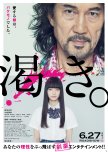
Nakashima Tatsuya is a genius Japanese director. His “Confessions” and “Memories of Matsuko” are living evidences of his brilliance. The downside is that he doesn’t come out much but when he does, it will be through a thought-provoking wild picture like The World of Kanako.
Being a serious fan of Nakashima filmmaking, I was eagerly anticipating this. But I wasn’t ready for this darker tone and pitch black atmosphere. Needless to say, I was pleased in a very good way. The picture was a clear depiction of an ill society with lots of vacancy within.
The storyline was based on several flashbacks to draw Kanako’s life. The multitude of switching between the past and the present was an intelligent procedure to keep the suspense until the end. Of course, the overuse might turn out confusing especially by the end but it was a definite win for the film’s two hours’ longitude.
The plot’s successively coherent events helped expressing the characters’ nightmarish adventures. But it was the excessive violence that pinpointed the severity of what actually happened. Of course brutal beatings and cuttings can come out extremely discomforting but it’s their gruesome nature that grabs the memory and highlights the nasty reality Nakashima was trying to illustrate: Nothing is what it seems. There’s always a hidden reality underneath.
Beside Nakashima’s explosive style in picturing a chaos in stunning colours, there were his brilliant main leads. They’re what strengthened my wish to see this picture in the first place; the veteran Yakusho Koji (he was on a whole different level), the brilliant Tsumabuki Satoshi, the charismatic Odagiri Joe, the much imposing Nakatani and even the impressive younger talents Hashimoto, Komatsu and especially Shimizu. The film’s loaded cast helped bringing few of the craziest characters ever.
There’s zero hero in this film. All of its characters are some sort of anti-heroes, psychos, sadists, violent pricks and even demons. It was the intense characterisation that made me glued to the screen the whole time. They make one hell of an entertaining bunch. They were perfectly entwined in a messy havoc. They even get crazier as the film goes on and on unravelling their traits one by one. Some characters didn’t get proper explanations as they popped on the screen but it all went well for the final blow.
Maybe Nakashima went abroad with the repeated violence, brutality, rape, drug use and all the ugly side of REALITY but it was especially genius how he has wrapped his characters in a surrealist cover of apparent fantasy. It does take a big director to convince his audience about the line between reality and fiction without getting caught in his own scenario. Hats off to you oji-san!
The World of Kanako is a fascinating take about the ugliness in society (more particularly Japanese). It’s an intriguing view about people’s masks and their crazy reactions when someone pushes the wrong button. It’s basically a gripping watch centring on wild characters being pushed to the edge.
Was this review helpful to you?
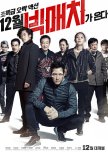
That brings us to Big Match. They were obviously trying to make one of those Hollywood films. You know, the ones intended for the market without actual depth, loaded with action, big special effects and same old cliché dialogues. It’s regrettable and doesn’t represent the growing South Korean cinema at all.
Leaving that aside, the film was purely a mean of divertissement. The general concept isn’t off. It had the entertainment keys due to a good mixture between humour and action. Well, the comedy part wasn’t exactly ‘hilarious’, but the action half was rather good. Nonetheless, the pacing wasn’t always attention-grabbing. The run time was too long for an action packed-film.
The main reason I watched this summarises in two of my favourite ahjussi’s and Korean cinema veterans: Lee Jung Jae and Shin Ha Kyung. Well, they both did what they had too. I wouldn’t say it took much effort with the kind of characters they were offered. Lee Jung Jae wasn’t a stand-out action lead but he was faithful to the characterisation which is more than enough. Shin Ha Kyung’s ‘funny psycho’ character didn’t come out funny or impressive but the actor’s way of personifying it was perfect. Only a veteran in Ha Kyung’s calibre can make you like (or at least appreciate) an uninteresting character.
Other performers didn’t stand out at all –except for Lee Sung Min. And there were too many useless, repeated, cliché characters to stand.
The action sequences were fittingly edited –a nice work of fiction. The music was nothing different from the usual South Korean films’ soundtrack and the cinematography work didn’t stand out much.
Big Match is by no mean a remarkable Korean film. It doesn’t even hold the identification of South Korean cinema. It was basically a forgettable action comedy led by two big stars.
Was this review helpful to you?
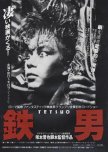
When reviewing a gory film, I usually start off with warnings so let me put this out. Tetsuo – The Iron Man is certainly not your stereotypical kind of film:
Surrealist: check; it will make you think more than once about its contents.
Bizarre: double check; if you think you saw the entire cinema craziness –think again.
Excessively violent: Triple check; this film belongs to my goriest films’ list and I sure as heck saw a wild bunch of those. It would be an extremely disturbing and trippy watch for gore-haters.
Hidden message: full score check. It’s what makes this picture special in the first place. There was a pinpointed meaning behind the whole mess.
Horror and Sci-Fi aren’t my thing. I don’t like the genres separately and I certainly don’t care for them combined. But I do have a special liking to the underground director Tsukamoto Shinya –a perfect crazily talented Japanese director to add to my favourite bunch.
Horrifically graphic, the film never ceased the use of violence and gore to highlight its events and developments. Even the introduction was brought under the wing of visual grotesque. I wouldn’t deny that brutal violence, dismemberment and bloody chases are to my liking but that’s not the main reason I highly appreciated this. As I said, I am used to gore especially the Japanese type but they rarely have a meaning behind the acts of violence unlike Tetsuo.
Tsukamoto used the incessant gore to imply its vision around deep fears of technology and how far its development can mess a man’s life. He spotlighted the transformation and the resistance in a grabbing visual ceremony of grotesque. Of course, this is an over-the-top pessimistic view of the relationship between humans and the increasing threats of technology. That aside, the surrealistic nature of the film will make you draw your own interpretations as long as you pay attention to the little details.
The choice of the black and white was spot on. It only aggravated the impact of the picture without damaging the brutal gore. It added a striking darker tone to the already pitch black shadowy theme. Moreover, the leads’ acting was obviously matching the choice of colours giving it a monistic feel. However, Tsukamoto Shinya was undeniably the main performer of this picture. He was the one who wrote, directed, edited and even added his own special effects to the film. His camerawork, masterful close angles, engaging cinematography and hard-core choice of music were one of the finest I saw in gory films.
Tetsuo is one of those surrealist crazily bizarre Japanese films. Its heavy load of gore and brutally graphic content is a great mean to ensure its purpose.
Was this review helpful to you?
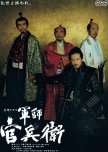
Kurode Kanbe is an acknowledged figure of the Sengoku period –the most chaotic era of Japanese history. He came from a humble clan in Himeji Castle but he distinguished himself through his impressing battle tactics. I will stop here to not spoil those who are unfamiliar with the history of the main character.
This taiga drama illustrated the life of the historically-famous strategist. It wasn’t only a numeric retell of his life story. On the contrary, Gunshi Kanbei was more focused on the emotional side more than anything. Which implores that you will get to know the story without the clinical heavy/slow pacing.
Sengoku Jidai is known for its numerous battles, renowned generals, political clashes, lots of betrayals and utter turmoil. This drama didn’t only illustrate Kanbe’s personal battles but it also included all of the major events that occurred during his lifetime. And since he was close to several main figures of the era, Kuroda Kanbei found himself entangled in all of those continued wars. He was forced to make critical decisions and became a key character in the unification of Japan.
That aside, Kanbe’s familial life was also put in the spotlight. His relationship with his vassals, his wife and his offspring was vastly explored and beautifully dramatized. But the over-idolizing was probably a bummer. Kuroda Kanbei wasn’t exactly a selfless man like the screenwriting pictured him to be. He was known to be quite ambitious. They didn’t focus much on that side except near the end. But again this isn’t a documentary and the main historical points were left untouched.
As usual in Taiga dramas, the cast was relatively loaded. Okada Juichi was marvelous as Kanbe. He’s definitely a rare Johnny’s –an idol of high caliber. I am so glad I got to first meet him through this. Other cast members were pretty fitting. But the ones who stood out the most were Egushi Yosuke’s Oda Nobunaga (one of the best portrayals of the legendary character), the penetrating performance of Takenaka Naoto as Toyotomi Hideyoshi, Nakatani as Kanbe’s wife, Tanihara Shosuke short yet amazing portrayal of Takenaka Hanbe and other remarkable talents like Tanaka, Kuroki, Uchida, Ikuta, Matsuzaka, Hamada, Tsurumi and Takahashi.
The directing was noticeably improved from previous taigas but it’s nowhere near perfect. The cinematography was catching. The sceneries and outfits were as usual historically accurate despite some insignificant flaws.
The smooth flowing of events in Gunshi Kanbei proves that this is an impeccable example of how taiga dramas are supposed to be.
Was this review helpful to you?

I have a confession to make; I always had a serious love-hate relationship with Sion Sono. It’s not because of his over the top style. Takashi Miike‘s more sadistic but he’s still one of my top favourite directors. However, all of my feelings toward Sion’s filmmaking changed to the positive side after this. He definitely amazed me.
The story was unusually chaotic. Tokyo Tribe is a Hip-Hop musical and I don’t even like Hip-Hop but man did it sound completely right! The plot centre on Tokyo’s different gangs that are continually at war with each other until a trigger sets them all off. 95% of the dialogues were rapped out. Sion made almost all of his characters rap their parts in a charming street symphony.
I would agree with you if you said this film was over the top, entirely sexist, brutally violent and edgy. However, those facts don’t deny that Tokyo Tribe is one of the best finely made films of 2014. The action sequences and characters’ interactions were eye-catching and marvellously made.
Sion’s explosive style was fast-paced –as always– which gave the film extra entertaining value. I didn’t like the CGI and some fallen parts here and there but I was certainly impressed to know that he actually cast real-life street tattooed members for his picture. They were undeniably fit and perfect for their roles.
Other actors, namely the veteran Yakuza star Takeuchi Riki, Sometani Shota, Suzuki Ryohei, Young Dais and Kubozuka Yosuke were strongly fit for their roles. I certainly didn’t think I would come to love their characters like that. The solid portrayal of bizarre and weird personas isn’t an easy job to do and this film’s cast brought it to perfection.
Tokyo Tribe was a throughout pleasurable mess of comedy –even parodies– action and some lessons. It’s not up to everyone’s taste but those who appreciate Japan’s weird filmmaking are in for an exciting treat.
Was this review helpful to you?
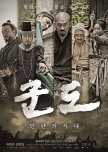
There's nothing new under the sun, the film is about a Ronbin Hood-like gang who steals from the corrupted rich and gives to the helpless poor. Set in the twilight years of Joeson period, the film is a hybrid historical piece about martial arts, nobility and revenge. The plot takes its time to make the main character meet his destiny but the remaining space wasn’t wasted at all; the screenwriting always focused on the remaining characters and some colourful dialogues in between.
Kundo depicts a strong combination between the usual Asian melodrama and martial arts’ style. It was successful at portraying both flying fighting scenes as well as the characters’ feelings within. It also focused on inserting some pretty nice dark humour sequences without disregarding the serious melodramatic tone of the period piece. The over use of explanatory narration might come out wrong in few sequences. The screenwriting over-focused on some trivial side stories but it managed to come back into the right track soon enough.
Led by the overly charismatic Ha Jung Woo, the acting department was impressive. The main character had a very rough start that made him a part of the Kundo tribe, his journey was pretty much enjoyable and Jung Woo was too darn good at making it feel real – except the age part of course, there’s no way he looks 18 to 22 year-old.
On the other hand, Kang Dong Won was the freaking king of the action department in this film. Being used to swordsmanship due to his other period action films; he did the whole remarkable martial arts himself without resolving to stunts; that’s in itself is too wonderful for words. Other than that, he was amazingly good at playing the role of the dangerous villain. Of course, the back story provided to his character was extremely helpful at setting an unbreakable ground for what he has to portray. It’s been a long time since I last saw a very detailed back story of a villain; as if they’re making you think that any monstrous thing he does is legitimate.
Other actors were pretty good; they were fit to each character they played especially the Kundo group where Ma Dong Seok, Jo Jin Woong and Lee Kyeong Yeong are only few to mention.
Inspired by Kurosawa and Tarantino’s filmmaking, director Yun Jong Bin pulled off a memorable piece. His directing style was poignant with top notch technicalities. It’s a fact that visuals worked so well for this film, the lavishing designs and well-chosen colours were a great plus for this film’s cinematographic appeal. Even the polished sceneries, well-crafted aristocrats’ mansions and clothes were very well handled.
Watch if:
-You like dramatic period pieces with action.
-You like combination between Asian and western filmmaking.
-You like the main actors because Ha Jung Woo and Kang Dong Won were extremely good.
Do not watch if:
-You dislike historical pieces.
Despite some minor flaws, Kundo Age of Rampant is a very pleasant period film that’s well-worthy of the domestic success it witnessed upon its release.
Was this review helpful to you?

Let’s get things straight; Ghibli Studio’s film is still superior in every way. But this version is also quite enjoyable. Unlike what the general audience might think, this isn’t a remake of the 1989 animation; it’s actually based on the original novel. As a consequence, many things are entirely dissimilar from the animated version. The character and the general climax were untouched but once Kiki arrives into the village, almost everything goes into a different way. This is considerate as a positive point since Shimizu didn’t try to copycat Miyazaki’s version. The little witch still tries to find her way into the world as she goes through puberty and deals many conflicting emotions. The thing about Kiki’s Delivery Service that it inserted stimulating subplots. Of course, it’s not that all of them were successful but it was enough to distinguish itself from the Ghibli Studio’s version.
Koshiba Fuka who played Kiki was convincing acting wise but that doesn’t apply on the aging criteria. She didn’t look like a 13 year-old in any way. However her co-star Hirota Ryohei was very believable as Tombo, he definitely shined better than the main character in this version. Some other characters were altered but it wasn’t very serious.
The CGI could be acceptable but the talking cat looked so fake that my eyes got hurt. Shimizu Takashi, better known as one of Japan’s horror films master decided to go with a family production this time and he did rather well with his angles and settings, if only the CGI was better handled.
Watch if:
-You like to see another version of the outstanding Miyazaki piece.
-You like family films in general.
Do not watch this if:
-You’re looking for a replicate.
-You dislike live action adaptations.
Kiki’s delivery Service is an okay family film. It differs from Ghibli Studio’s iconic animation even if it shares the same concept.
Was this review helpful to you?
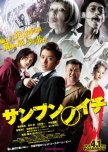
The film starts out very simple; a bank robbery already took place and the three culprits are trying to divide the money amongst themselves. Things start to get fishy between the three partners as schemes and hidden motives start to surface. An endless game of trust begins to shatter their relationship. However, the plot doesn’t keep lingering on that narration pattern. After a while, we get countless of smartly inserted flashbacks which explain our main characters, the people who threatened them and their motives to commit a robbery.
Saibun no Ichi screenwriting is pretty clever at grabbing the audience attention. It kept adding a twist after the other and a development after another which had a strong effect to keep me glued to the screen. It even triggered a nice guessing game about the following events. However, the script wasn’t perfect by any mean. It failed at balancing comedy and crime. It’s obvious that those two genres are entirely different but it’s not supposed to be this confusing. At some time frame, it became painful to set my mind: am I supposed to laugh or feel the chills? Before I knew it, the scene passes by as if nothing happened. After all, it was some type of a crazy film. Those of you who are well familiar with the “weird Japanese cinema” will know what I am talking about.
Unlike most Japanese film, One Third had some exceptional conversations about Hollywood films, actors, directors and even similar settings. One of the main characters is an actress while the main character himself aimed to become a director just because he was fascinated with Quentin Tarantino’s filmmaking. I found it rather innovative to discuss those types of topics in a Japanese picture. It’s also ironic because the goofy references they mentioned worked so well in building many scripts and swindling games inside the story. It felt like the whole film was some kind of a big fat play.
Now, let’s talk about the acting. Honestly, I didn’t feel so good about the leading cast but they were surprisingly fine. I have some type of issues with Fujiwara’s overacting, he was originally a theatre actor and he doesn’t seem to set a clear barrier between the stage and the big screen. However, to do him credit; I noticed obvious improvement in some of his recent works. One Third’s leading role counts for his favour. He even made his character appealing enough, aided by the fine characterization of course. Then we have Tanaka Koki, I apologize to his fans but I never for once thought of him as a good actor. His character saved him though, he was interesting as the ruthless cool Koji, even the acrobatic and fighting scenes he had were pretty good.
Other notable actors are definitely Kubozuka Yosuke and Nakashima Mika; the first played a lizard-like complex character while the latter played a very convincing ex-actress. Both of them led pretty well-crafted performances with those odd characters. But then again, all of this film’s characters are a nice bunch of anti-heroes.
Actor turned to director Shinagawa Hiroshi did a fine job with directing and writing this piece, I especially liked the visuals, some of the little details in the background made this film rather special.
Watch if:
-You like different unconventional Japanese films.
Do not watch if:
-You don’t appreciate crazy/wild Japanese cinema.
-You dislike Japanese humour.
Sanbun no Ichi is a nice surprise that came at a whim. It might be too crazy for some tastes but I always had a soft spot for untraditional Japanese filmmaking. This is a very entertaining picture in my personal book.
Was this review helpful to you?
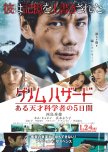
Depending on the angle you judge it from, Genome Hazard can be considered as a very engaging thriller. At the matter of fact, the picture was divided into several genres. I wouldn’t say they were in complete harmony but some of them worked out in a good manner. The mystery/thriller part was pretty well-executed; the build-up of suspenseful events was definitely able to trigger the audience‘s attention. At some point, you’d find yourself relating to the main character and trying to solve the puzzling equation by his side: a normal man with a double identity and an apparent amnesia, or is it? It’s a complete relief that the screenwriting didn’t try any mischievous attempts to out shadow its viewers.
The other part is Science fiction, I completely respect the idea of turning this into some type of a medical thriller with all of those virus/pharmaceutical schemes but I am sure that the screenwriter (or more like the original novel perhaps) didn’t know how to handle the part overall. Somehow, it felt a bit sarcastic towards science even in a discreet way. This opinion is not based on the fact that I am a scientist myself – although it did trigger me a little. I believe the outcome they resulted from that long science fiction battle was absolutely disappointing. I mean if you were going to go all out and crazy about a scientific fact then you should’ve proved that the trip was worth it. The scientific part obviously failed at portraying a deep meaningful issue.
Genome Hazard had attempts of building romance as well but I don’t think it was successful at that part either. There were too many love interests but none of them came out convincing. Well, it’s unavoidable because when you’re making a film that’s packed with different themes, it comes natural to fail some genres for the favour of others. The thriller/mystery part outclassed Sci-Fi and Romance by miles.
Nishijima Hidetoshi was the absolute star of the picture. That actor’s theatrical acting style and gaze always had me at the edge of my seat; he will always make his character so charismatic and attention-grabbing. His role in this film proved me how much I love to see him on screen. By his side was the Korean actress Kim Hyo Jin; this was the first time meeting her and I would say it was a pleasant introduction. The girl has some cool talent in her; I deeply respect her dedication to learn Japanese solely for this role. The rest of the cast were also fitting; Maki Yoko and Ibu Masato are few to mention.
This film’s directing was so fine. I am not so familiar with Kim Sung Soo but his editing style and camera angles were pretty well-handled. The cinematography was also good and rather catching. I don’t have a clear memory about the musical note though, I think it wasn’t so different from what normal thrillers use as their soundtracks.
Watch if:
-You like thrillers, Japanese or Korean style.
-You like intriguing mysteries.
Do not watch if:
-You don’t appreciate thrillers.
-You’re looking for a strong deep Sci-Fi.
Genome Hazard is a very captivating thriller at first sight but it’s true that it fails at building a coherent storytelling. It’s not perfect by any mean but it’s unquestionably entertaining and engaging in its own way.
Was this review helpful to you?
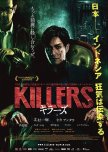
There are no twists to follow in here, the film kept a steady pattern as it unravelled the complicated human emotions between two killers and their surroundings. While it’s not so common for Indonesia and Japan to co-produce a film, I must say that it turned out quite well. The Mo Brothers previously caught my attention through another gory film. I love directors who go through all the trouble of inserting a deep meaningful plot into their gory productions. Although that may affect the brutality of the picture but it’s still way better than a gore for the sake of gore pictures.
Just like it was co-produced by the two countries, Killers’ plotline was divided between Indonesia and Japan. The film took its time to become interesting, it tried to start with a blow but it was unbearably slow until it finally picked interest. Generally speaking, the film has its own pacing problems that are hard to ignore. However, it still succeeded at conveying a meaningful message. The psychological take on serial killers had a deep effect in the main characters’ development. At some point, you would understand the directors’ aim of bringing those conflicts into an open showdown.
The narrative pattern was inserted with short sequences of dark humour that brought me to laughs. I always thought that black comedy was one of the better elements of gore productions. Talking about violence, the amount of bloody killings wasn’t exactly that high and the methods weren’t extremely brutal. I know that most people find this type of gore sick, disturbing and over the top but it’s definitely not, and I am speaking from the point of view of a splatter gore fan. This wasn’t hard-core enough but it was acceptable and enjoyable.
The acting was spot on. Kitamura Kazuki was extremely good as a professional serial killer; his aura and unique vibe made him portray the character in a perfect manner. The Indonesian male lead was also convincing but Kitamura owned the show for me. The characterization was quite deep, it was clear that the screenwriting worked its way to build a controversial relationship between two different types of killers. Their dialogue was one of the most entertaining phases throughout the whole picture.
The cinematography and directing were fine. Nonetheless, I found trouble to cope with the camera-work in the Indonesian part of the story; some shaky camera and close-ups didn’t come out right. Other than that, the whole atmosphere was rather catching.
Watch if:
-You like films about psycho killers.
-You like gory pictures with meaningful plots. Be warned however, this is not hard-core enough.
Do not watch if:
-You dislike gory productions or you can’t handle them.
“Killers” is a deep take about the surreal psychological side of serial killers. It has its own weak points but it was successful at depicting a stylish type of gore in a brutal gripping manner.
Was this review helpful to you?
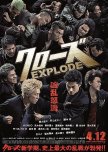
Being a fan of Miike’s filmmaking, it was unavoidable to miss the highlighted foolish characterization, extreme violence and hilarious black humour inserted everywhere. That being said, I never expected Toyoda to do the same. After all, two different directors have entirely dissimilar way of making their pictures. Crows Explode leaned to the realistic side way too much which was a bit wrong in my opinion; don’t get the wrong idea, immersing the characters and fighting scenes in realism didn’t sound like a bad treat but when it’s over-done with this type of film then things are bound to become bothersome.
To make things clear, this film had too many similarities with its famed prequels. The fight to become Suzuran’s top leader was still used as the main thread to drive the plot. However, the fighting sequences to reach that objective were surprisingly demure and repetitive in a worrisome way. Although Toyoda tried to focus on the human emotions between his characters, he didn’t exploit his main leads’ potential to the fullest. Thus, many feelings couldn’t get pass the screen barrier to reach the watcher’s heart.
Crows Explode narrative pattern was composed of several side stories that didn’t serve any meaning at times. At the matter of fact, few of them were just used to fill the running time instead of building characters’ back stories. To some extent, most of them were heavy to watch especially with the obvious lack of fighting scenes; they became utterly irrelevant to the film’s development. Let’s not forget the near-disappearance of black humour – which I clearly don’t blame Toyoda for it. The last fighting sequence wasn’t blowing but it delivered a nice punch after all.
The entirely different cast is worrisome, isn’t it? I know that many people can’t imagine the “Crows” without Oguri Shun and Yamada Takayuki on top of them. I am a big fan of those two actors myself but shockingly, their disappearance didn’t make me feel bad. I did want them to be in here but the new faces weren’t bad at all. Led by raising stars like Higashide and Yagira, the acting department did the trick for the lack of better words. Some actors didn’t convince me much but I can’t put all the blame on them, the way their characters’ were written didn’t allow them to show a wide range of emotions or action.
The cinematography was trying to be the same as the two Crows Zero but it didn’t come out that way, I believe the yellowish atmosphere is the film’s way of distinguishing itself from the others. The musical note was the same so there's nothing to complain about in that department. The directing style and the setting of fighting sequences are debatable but Toyoda made sure to leave his mark which is more than enough to respect a director.
Watch if:
-You like both Crows Zero but make sure to watch this with an open mind.
-You like school fighting.
Do not watch if:
-You’re looking for a “copy-paste” version of Takashi Miike’s prequels.
Crows Explode had its own touch of filmmaking but the serious realistic depiction that Toyoda decided to use didn’t come out entirely right, just like it wasn’t entirely wrong. Due to its entirely different pattern, this sequel should be viewed for its own merits, comparing it to Miike’s Crows will only make it harder to watch and judge.
Was this review helpful to you?
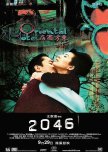
2046 can be considered a loose sequel to the director’s previous smashing piece “In the Mood for Love” but it can be watched for its own merits as well. Despite its abnormal twisty narrative pattern, the film is simply the tale of broken love, unstable emotions and unbearable suffering in the past, present and the future. The protagonist’s monologue was the main focus of driving the plot forward; it held hypnotic significance to the characters’ sensations.
This film leaves a lingering impact. The time frame metaphors Kar Wai used for this film were too impressive for words. He simply tried to tell the past through the future but instead of giving it out bluntly, he went through all the trouble of making this a memorable artistic piece instead. This is the story of a miserable man with love; he can’t seem to keep the women he meets by his side. Is it his broken emotional state or what? He then starts to pour his personal experience and thoughts into his fictional erotic novels. But that’s not it, the writing and editing styles don’t work in an obvious manner, there are always hidden hints and even some transparent humour. Even the apparent limited space holds extravagant and wide meanings behind it.
My blame would be the slow pace sometimes but it never last too long to bore me.
Such a poetic piece had few of the better Hong Kong actors as its main performers plus a Japanese renewed face Kimura Takuya. Tony Leung reprised his role only with a different characterization. Zhang Ziyi led one of her most memorable performances while Gong Li, Faye Wong and Carina Lau had mesmerizing screen presence aided by the top notch writing of their characters. The female department in this film was everything that Wong Kar Wai pictures in women including his passion and his resentment.
That being said, it doesn’t take a genius to state that the best performer was undeniably Wong Kar Wai, the director, the screenwriter, the artist, the poetic, the ingenious and one of the finest filmmakers the world ever knew. His touch was all over the picture; whether it was his overwhelming emotional take, his challenging narrative pattern, his stunning characterization and especially his philosophic and psychological view of love and lust. Let’s not forget his special camera angles, fast cuts and slow motions that he excels at.
Using a specific range of colours, the film was visually dazzling; the cinematography was a drop of brilliance in each scene. Accompanied by a tremendous musical choice and a remarkable production value, the film was wonderfully done. That’s nothing less from Kar Wai, who always manages to impress through his unconventional pictures.
Watch this if:
-You like Wong Kar Wai films.
-You like poetically artistic love stories.
Do not watch if:
-You’re looking for a traditional love story.
2046 is a challenging emotional take about love. It extends from the past through the present and until the future. Such a complicated tale takes a masterful brilliant director like Wong Kar Wai to pull it though successfully.
Was this review helpful to you?
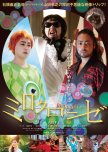
Full of insanely vivid range of colours, the film is one of the most unique craziest pictures I came across in a very long time. It can be divided into four segments where two of them are strictly connected and the two others don’t belong to the same narration procedure. The film itself is a different depiction of obsessive love and its consequences on the male protagonists. It’s surprisingly a quite deeper and philosophical take than what meets the eyes.
Director and screenwriter Ishibashi Yoshimasa was able to successfully mix a wild variety of genres and styles in one film. The first part was so bright both in visuals and storytelling; it starts off quite peacefully to tell the story of Ovreneli Vreneligare – a very strange name especially in Japanese pronunciation. The narration itself was pretty strong for the most part even if it didn’t matter at all in some areas. The second sequence (my personal favourite) is about a relationships’ counsellor who advices “loser” boys in the strangest ways ever. However, the amusing part must be his “victory” show-off dance after each of those calls, as if he’s congratulating himself for a well-done job. The dancing style and the women by his side are completely hilarious if you manage to grab the essence of his actions. Next is the story of a time traveller Samurai who’s searching for the love of his life who was taken away from him, it was action packed with many engaging scenes. The whole running time was concluded by resuming the story of Ovreneli Vreneligare who grew up to create one fine finale for this piece.
One cannot appreciate this film without over-praising the indisputable star of the whole picture Yamada Takayuki. Being a big fan of his talent and acting style, I am ashamed to admit that it took me this long to watch his best acting performance to date. He’s a freaking chameleon! Yamada played three completely different characters yet he was able to grab the gist of all of them. At one moment, he’s a rude womanizer love coach, the next moment he’s one badass vengeful samurai and at the end he’s a shy boy in a man’s body. This is the best example to witness Yamada’s vast acting range and incredible versatility. All other cast members didn’t manage to shine by his side, not even for a while.
Cinematography and artistic visuals are the heart and soul of this film. Knowing that Ishibashi is originally a multimedia artist is definitely a plus that counts for the picture’s impact. The bright dazzling colours were quite captivating and the fighting sequences in the last part were highly intriguing. Although the length of slow motion action can become heavy after a while, it didn’t bore me a bit. The editing style was quite bizarre and chaotic but it still managed to come out so wonderfully. It’s worthy to mention that the soundtrack was ear-pleasing.
Watch if:
-You’re used to weird Japanese productions.
-You’re tuned to mangas, anime and online games.
-You like a special experience and a very distinctive definition of love.
Do not watch if:
-You completely dislike strange Japanese films.
-You dislike crazy plots which can go completely overboard.
Milocrorze: A Love Story is a very special experience about the common theme of love and separation. It evokes an enjoyable light-hearted experience that’s bound to leave you with a big smile on your face.
Was this review helpful to you?
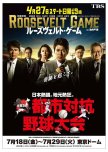
Coming from the same director, producer, channel, screenwriter and the one and only genius novelist Ikeido Jun behind Hanzawa Naoki; you’re bound to expect striking similarities such as the general structure, the business related events, the suspenseful tries to get out of financial troubles, the directing techniques and even the acting style. To many viewers, this may seem like TBS’s desperate tries to follow the footsteps of last year’s mega-hit drama and even re-incarnate its successful ratings. However, Roosevelt Game was able to clearly distinguish itself. This is definitely not another Hanzawa Naoki so do not misjudge this as a copycat.
Roosevelt Game is driven by two main threads: Business management and Baseball. At first glance, you would wonder if those two different themes are able coexist. I had my careful doubts about that matter but colour me surprised! They weren’t only in perfect harmony but they were also smartly written to complement each other which gave the drama a strange yet a very solid balance. The fascinating part is that Aoshima Seisakujo followed similar policies in both company management and sports which made things even more connected and delightful to follow.
This drama excels at building the thrills, you will find yourself at the edge of your seat countless of times. Not to mention the “What the… What the heck was that?” moments. It’s no surprise since this comes from the brilliant novelist Ikeido who’s known of his thought-provoking corporate scripts. The reason why I came to favour the business genre is their highly intriguing scriptwriting and witty dialogues, that part wasn’t any different in here, I was completely satisfied with the financial suspense they built even if the outcome was somewhat predictable. The sports’ part was equally exciting; I never get that feeling unless I am watching a real game or a sports anime. To think that they got me rooting for them out loud is beyond belief.
Acting wise, I have nothing but praise. I never thought that a star-studded cast like this one can go wrong in any way. I was already fascinated by Karasawa Toshiaki in another business oriented drama “Fumo Chitai” and ever since then, I have huge respect towards him. Once again, he drew me to his fearsome ability of turning into an intense actor when his character demands him to. His character was smart, firm and penetrating. Egushi Yosuke’s performance was too mystic; the way his character was written didn’t allow him to show his body language like he’s used to. However, he held an important cryptic character that always attracted attention. Another main character was Kudo Asuka, a young talent that held the realms of the baseball team. He had one memorable performance despite his obvious inferiority to his older seniors mentioned above.
The rest of the cast members were quite fitting for the drama which is nothing out of line for a great business production like this one. Tezuka Toru and Kagawa Teryuki were the better supporting actors. The latter amazed me as usual although I really wished that his talent was exploited further than that. I think this drama is unique due to the human relationships the writer inserted between his characters. The heart-warming events don’t imply that this drama was set in the heartless word of economy and business. That’s definitely a plus point that distinguishes Roosevelt Game from its fellow business oriented productions.
The cinematography was dazzling, literally. The bright colours used for this drama added vivid feeling to the usual sombre business atmosphere. The directing was definitely too similar to Hanzawa Naoki with those famed close-ups and captivating angles. One more thing, that OST was definitely a master’s stroke. That instrumental music was such a perfect fit for this drama’s theme.
Watch if:
-You like highly intriguing dramas.
-You like business/corporate.
-You’re looking for something similar to Hanzawa Naoki but beware, this is definitely different.
-You like sports dramas because baseball was a major part.
Do not watch if:
-You dislike the business theme.
Roosevelt Game is by far, the better written and executed drama of 2014. It contains a daring yet a very successful combination of the merciless world of business and the exciting world of sports. It should be enjoyed for its own benefits. Do yourself a favour, don’t misinterpret this as another Hanzawa Naoki.
Was this review helpful to you?

























